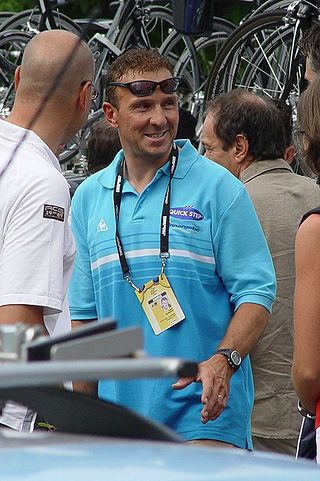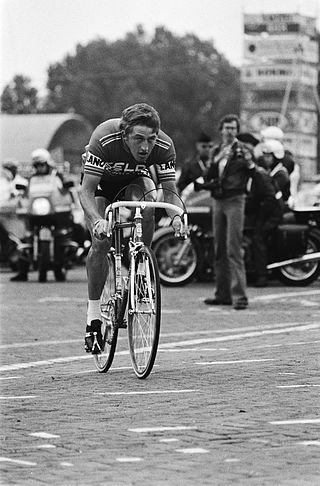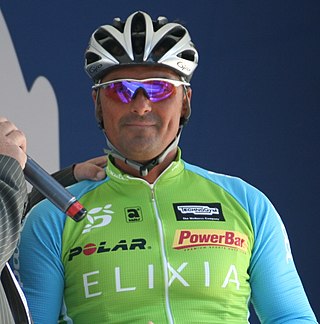
Bernard Hinault is a French former professional road cyclist. With 147 professional victories, including five times the Tour de France, he is often named among the greatest cyclists of all time. In his career, Hinault entered a total of thirteen Grand Tours. He abandoned one of them while in the lead, finished in 2nd place on two occasions and won the other ten, putting him one behind Merckx for the all-time record. No rider since Hinault has achieved more than seven.

Stephen Roche is an Irish former professional road racing cyclist. In a 13-year professional career, he peaked in 1987, becoming the second of only two cyclists to win the Triple Crown of victories in the Tour de France and the Giro d'Italia general classification, plus the World road race championship, the first being Eddy Merckx. Roche's rise coincided with that of fellow Irishman Sean Kelly.

Johan Museeuw is a retired Belgian professional road racing cyclist who was a professional from 1988 until 2004. Nicknamed The Lion of Flanders, he was particularly successful in the cobbled classics of Flanders and Northern France and was considered one of the best classic races specialists of the 1990s.

Hendrik Gerardus Joseph "Joop" Zoetemelk is a Dutch former professional racing cyclist. He started and finished the Tour de France 16 times, which were both records when he retired. He also holds the distance record in Tour de France history with 62,885 km ridden. He won the 1979 Vuelta a España and the 1980 Tour de France.

Roger De Vlaeminck is a Belgian former professional racing cyclist. He was described by Rik Van Looy as "The most talented and the only real classics rider of his generation". Nicknamed "The Gypsy" because he was born into a family of traveling clothiers, he is known for exploits in the cobbled classic Paris–Roubaix race, but his performances in other "Monument" races gave him a record that few can match. His record in Paris–Roubaix earned him another nickname, "Monsieur Paris–Roubaix".

Henri "Rik" Van Looy is a Belgian former professional cyclist of the post-war period. Nicknamed the King of the Classics or Emperor of Herentals, he dominated the classic cycle races in the late 1950s and first half of the ‘60s.

Freddy Maertens is a Belgian former professional racing cyclist who was twice world road race champion. His career coincided with the best years of another Belgian rider, Eddy Merckx, and supporters and reporters were split over who was better. Maertens' career swung between winning more than 50 races in a season to winning almost none and then back again. His life has been marked by debt and alcoholism. It took him more than two decades to pay a tax debt. At one point early in his career, between the 1976 Tour and 1977 Giro, Maertens won 28 out of 60 Grand Tour stages that he entered before abandoning the Giro due to injury on stage 8b. Eight Tour stage wins, thirteen Vuelta stage wins and seven Giro stage wins in less than one calendar year.

Malcolm Elliott is a former English professional cyclist, whose professional career has lasted from 1984 to 1997 when he retired and from 2003 up to 2011 when he made his comeback in British domestic racing.

Andrei Tchmil is a retired Soviet, Moldovan (1992–1995), Ukrainian (1995–1998) and Belgian professional road bicycle racer. He competed in the men's individual road race at the 1996 Summer Olympics.

Michel Pollentier is a Belgian former professional road bicycle racer.

Filippo "Pippo" Pozzato is an Italian former road racing cyclist, who rode professionally between 2000 and 2018 for the Mapei–Quick-Step, Fassa Bortolo, Quick-Step–Innergetic, Liquigas, Team Katusha, Lampre–Merida, and two spells with the Farnese Vini–Selle Italia/Wilier Triestina–Selle Italia teams.

Walter Godefroot is a retired Belgian professional road bicycle racer and former directeur sportif of Team Telekom, later known as T-Mobile Team.

Charly Mottet is a French former professional cyclist. He was one of the best French road cyclists of his era.

Joseph Bruyere or Bruyère is a former Belgian cyclist.

Tom Steels is a Belgian former professional road bicycle racer, specialising in sprint finishes and one-day races. He was one of the top sprinters in the peloton.

Andreas Kappes was a German cyclist, who was a professional from 1987 to 2009, active on the road and on the track, collecting in total 133 wins, and, as an amateur, represented West Germany at the 1984 Summer Olympics in Los Angeles. During the first half of his career he mainly raced on the road, eventually resulting in 99 wins, including winning Omloop het Volk (1991), Tour de l'Oise (1991), three stages in the Tour de Suisse, two stages in Paris–Nice and one stage in the 1988 Giro d'Italia. During the second half of his career he limited his activities on the road to mainly German criteriums as well as kermesses, which make up the chief part of his wins on the road. During the 1990s and 2000s he became known as a formidable track cyclist, including by winning 24 Six-day races, 13 of which with the Belgium Etienne De Wilde.
Johan Lammerts is a retired road bicycle racer from the Netherlands, who was a professional rider from 1982 to 1992. His biggest success came in 1984, when he won the Tour of Flanders and the Ronde van Nederland. Lammerts also won the 20th stage of the 1985 Tour de France.

Edvald Boasson Hagen is a Norwegian professional road racing cyclist, who rides for UCI ProTeam Team TotalEnergies. He was ranked as no. 3 in the world by UCI as of 31 August 2009, when he was 22 years old. He is known as an all-rounder, having won the Norwegian National Road Race Championships in 2012, 2015 and 2016. He is also a ten-time winner of the Norwegian National Time Trial Championships.

Fabio Baldato is an Italian former racing cyclist. In 2008, he was the oldest rider in a ProTour team. His cycling career ended when he crashed heavily in the Eneco Tour. He also competed at the 1988 Summer Olympics and the 1996 Summer Olympics.
David J. Akam is a retired track and road cyclist. He was active professionally between 1984 and 1987.


















